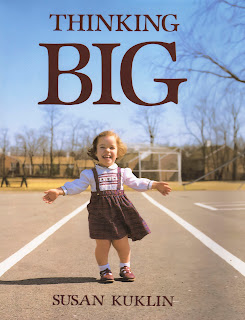Barbara Kerley’s Sept 13 blog about strong opening paragraphs, Balloons, got me thinking about what makes a good closing. Typically writers and teachers reason that the last sentence needs to sum up, tie together, or provide closure to a narrative. But science, history, and other subjects such as human rights [a personal favorite] change, grow, and evolve without an end in sight, or a clear trajectory from the past. So the last paragraph is not necessarily end of story.
Years ago I wrote and photographed a book about the life and times of an eight-year-old dwarf. Her name is Jaime. This was the second book I authored and illustrated, and the first children’s book about dwarfism. I wanted it to be perfect. After spending months and months with Jaime, her family, and her friends, I had a large body of material to easily pare down to a thirty-two-page picture book. But I didn’t have an ending. Over and over I returned to Jaime’s home in New Jersey, trying to uncover that impeccable final phrase that would tie everything together. No luck.
Why couldn’t I get Jaime to say something like this: “Yes, she thought, laying down her brush in extreme fatigue, I have had my vision.” Well, Virginia Woolf had already ended To the Lighthouse with that stunner. But my Jaime was so smart, so wise; she could have come up with something like that. I kept pushing, taping, waiting for a Virginia Woolf moment.
Finally in exasperation because I was driving him and this wonderful child crazy, my husband said, “She’s eight years old, for goodness sake! [He used stronger language.] She’s not ready for an ending.” Then he closed his eyes and pointed to a group of sentences on the storyboard mess of text and photos strewn across the floor. “There’s your ending.” Lo and behold, the last line was right there patiently waiting for its close up: "I’m like everybody else, just little.”
In my view the reader does need some kind of closure, but it need not be detailed, complete. I like books that allow the reader a little breathing space, space to wonder. My favorites are the ones where I wistfully reread the last lines before closing the cover.
There are gazillions of great endings in literature. One that particularly moves me is from Oliver Sacks’s Musicophila:“But to those who are lost in dementia, the situation is different. Music is no luxury to them, but a necessity, and can have a power beyond anything else to restore them to themselves, and to others, at least for a while.”
And you? When do you know your book, article or essay is complete? Please share your favorite endings – the ones you have written, and ones you wish you had written?
And Jaime? She’s become a beloved first grade teacher, who continues to think big, and is not nearly ready for her ending.


I'm not a writer..but I am a reader, a mother, and a teacher, and I love this site... Lots of great nonfiction for me to explore and share with the children in my life.
ReplyDeleteI love this post. Beautifully written. Now I'm going to put your book on hold at the library. Thanks!
Thank you, Jennifer, your comment is much appreciated.
ReplyDeleteI think you made an important point. In history, there really aren't final endings. There's always the need to rethink and reassess.
ReplyDeleteI think it would be interesting to examine how science and social studies writers "end" their books--especially when their topics have no endings.
Thanks for a thoughtful post.